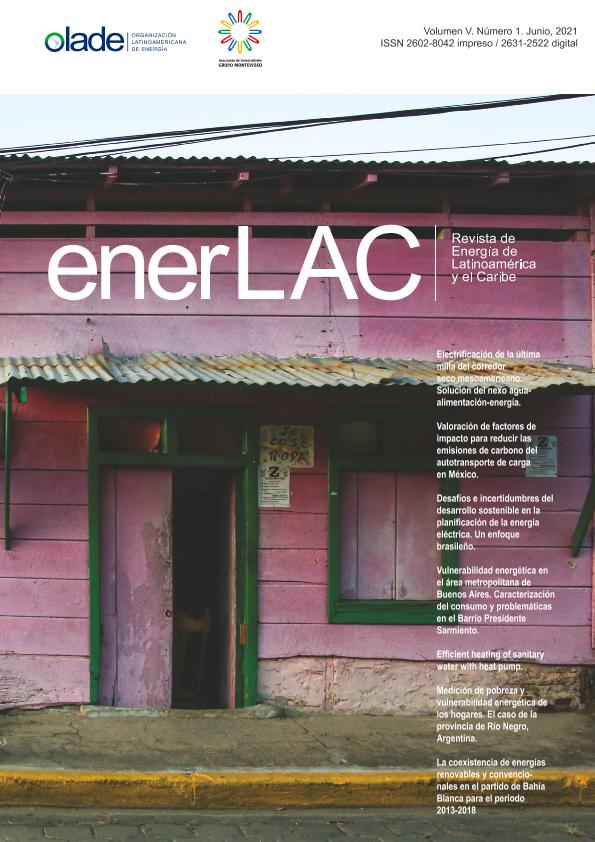Mostrar el registro sencillo del ítem
dc.contributor.author
Civitaresi, Héctor Martín

dc.contributor.author
Dondo Bühler, Mariana Beatriz

dc.contributor.author
Sarmiento, Jesica Isabel

dc.contributor.author
Attaguile, Miguel Darío

dc.contributor.author
Capuano, Ana Maria

dc.contributor.author
Savarese, Mariana

dc.date.available
2022-09-06T12:48:40Z
dc.date.issued
2021-06
dc.identifier.citation
Civitaresi, Héctor Martín; Dondo Bühler, Mariana Beatriz; Sarmiento, Jesica Isabel; Attaguile, Miguel Darío; Capuano, Ana Maria; et al.; Medición de Pobreza y Vulnerabilidad energética de los hogares: El caso de la provincia de Río Negro, Argentina; Organización Latinoamericana de Energía; enerLAC; 5; 1; 6-2021; 106-126
dc.identifier.issn
2602-8042
dc.identifier.uri
http://hdl.handle.net/11336/167519
dc.description.abstract
El acceso a energía permite satisfacer diferentes necesidades básicas tales como cocción, calentamiento de agua, calefacción, etc. Sin embargo, la falta de conexión a redes de distribución o un costo elevado en relación al ingreso familiar imposibilitan su satisfacción. Los conceptos de pobreza y vulnerabilidad energética reflejan estas privaciones energéticas en sus distintas dimensiones de análisis. En este artículo se realiza un diagnóstico en la provincia de Río Negro, Argentina, usando información de la Encuesta Nacional de Gastos de los hogares. Los resultados indican que, en promedio, el 11.3% de los hogares son pobres en la dimensión energética y que el porcentaje es mayor para aquellos que no tienen acceso a la red de gas natural y para hogares de menores ingresos. Además, el subsidio estatal de consumo residencial de gas morigera la pobreza energética, aun cuando la medición probablemente subestime el impacto para áreas provinciales con inviernos más fríos y prolongados. Con estos resultados se aporta información a los hacedores de política para diseñar o perfeccionar instrumentos con una focalización apropiada de la población afectada. Se destacan la necesidad de profundizar el análisis de dimensiones no monetarias de la vulnerabilidad energética y realizar estudios diferenciados territorialmente.
dc.description.abstract
Access to energy allows satisfying different basic needs such as cooking, water heating, heating, etc. However, the lack of connection to distribution networks or a high cost in relation to family income make it impossible to satisfy them. The concepts of poverty and energy vulnerability reflect these energy deprivations in different dimensions of analysis. This article makes a diagnosis in the province of Río Negro, Argentina, using information from the National Survey of Household Expenditures. The results indicate that, on average, 11.3% of households are poor in the energy dimension and that the percentage is higher for those who do not have access to natural gas networks and for households with lower income. Furthermore, the state subsidy for residential gas consumption alleviates energy poverty, even though the measurement probably underestimates the impact for provincial areas with colder and longer winters. With these results, we provide information to policy makers to design or improve instruments with an appropriate targeting of the affected population. The need to deepen the analysis of non-monetary dimensions of energy vulnerability and carry out territorially differentiated studies, is highlighted.
dc.format
application/pdf
dc.language.iso
spa
dc.publisher
Organización Latinoamericana de Energía
dc.rights
info:eu-repo/semantics/openAccess
dc.rights.uri
https://creativecommons.org/licenses/by-nc/2.5/ar/
dc.subject
POBREZA ENERGETICA
dc.subject
VULNERABILIDAD ENERGETICA
dc.subject
ACCESO A LA ENERGÍA
dc.subject
ASEQUIBILIDAD ENERGETICA
dc.subject
GASTO EN ENERGIA
dc.subject
ARGENTINA
dc.subject.classification
Otras Economía y Negocios

dc.subject.classification
Economía y Negocios

dc.subject.classification
CIENCIAS SOCIALES

dc.title
Medición de Pobreza y Vulnerabilidad energética de los hogares: El caso de la provincia de Río Negro, Argentina
dc.title
Measuring household energy poverty and vulnerability: The case of province of Río Negro, Argentina
dc.type
info:eu-repo/semantics/article
dc.type
info:ar-repo/semantics/artículo
dc.type
info:eu-repo/semantics/publishedVersion
dc.date.updated
2022-08-30T19:58:16Z
dc.identifier.eissn
2631-2522
dc.journal.volume
5
dc.journal.number
1
dc.journal.pagination
106-126
dc.journal.pais
Ecuador

dc.journal.ciudad
Quito
dc.description.fil
Fil: Civitaresi, Héctor Martín. Universidad Nacional de Río Negro; Argentina
dc.description.fil
Fil: Dondo Bühler, Mariana Beatriz. Consejo Nacional de Investigaciones Científicas y Técnicas. Centro Científico Tecnológico Conicet - Patagonia Norte; Argentina. Universidad Nacional de Río Negro; Argentina
dc.description.fil
Fil: Sarmiento, Jesica Isabel. Consejo Nacional de Investigaciones Científicas y Técnicas. Centro Científico Tecnológico Conicet - Patagonia Norte; Argentina. Universidad Nacional de Río Negro; Argentina
dc.description.fil
Fil: Attaguile, Miguel Darío. Universidad Nacional de Río Negro; Argentina
dc.description.fil
Fil: Capuano, Ana Maria. Universidad Nacional de Río Negro; Argentina
dc.description.fil
Fil: Savarese, Mariana. Universidad Nacional de Río Negro; Argentina
dc.journal.title
enerLAC
dc.relation.alternativeid
info:eu-repo/semantics/altIdentifier/url/https://enerlac.olade.org/index.php/ENERLAC/article/view/159
Archivos asociados
